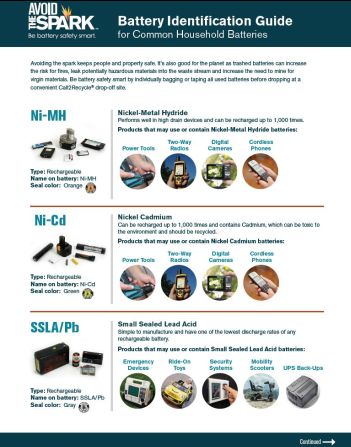
State law bans batteries from the trash.
Did you know how easy it is to recycle batteries in Vermont? That's right. Household batteries, both single-use and rechargeable, can be dropped off at more than 100+ convenient locations throughout Vermont. Most locations accept cell phones too. For all other larger batteries like car, motorcycle, and boat lead-acid or E-bike and E-scooter batteries, contact your local Solid Waste Management Entity for a drop off location near you.
Not sure what kind of batteries you have? Learn all about the common types you might have around your home:

Visit Call2Recycle.org/Vermont for all your battery recycling questions and watch their short video to learn how battery recycling works.
Battery Safety
For fire prevention, keep batteries out of your blue bin recycling and the trash; use one of the collection sites listed here. Remember to bag or tape each of your batteries to keep them safe during transport. See this fact sheet for more detail on why battery safety is important and this training video on battery safety for facilities.
Large Lead-acid Battery (boat, motorcycle, vehicle)
Lead-acid batteries are banned from landfill disposal in Vermont. State law (Act 220, effective 1993) requires retailers to accept spent large lead-acid batteries in return for those that they sell and requires that collected batteries be recycled. Large lead-acid batteries can be recycled at retailers, auto part stores, salvage yards, and many transfer stations. Contact your local Solid Waste Management Entity for a drop-off location near you.
If you are a business who has large lead-acid batteries, please see guidance on proper management: Lead-acid Battery Fact Sheet. There are many battery recyclers and service providers who may offer collection service for large volumes of lead-acid batteries.
Final Vermont Primary Battery Stewardship Plan
Final Vermont Primary Battery Stewardship Plan, submitted by Call2Recycle; approved by the VT ANR in November 2020
Approval letter (January 21, 2021)
2019 Report on Battery Stewardship
2023 Vermont Primary Battery Stewardship Annual Report by Call2Recycle
Primary Battery Stewardship Program Collection Rate 2024
ANR Approval of 5-year Audit Report
Information for Battery Manufacturers
Effective July 1, 2024: Vermont Primary Battery and Rechargeable Battery Product Stewardship Law
Vermont Primary Battery and Rechargeable Battery Product Stewardship (Act 152 of 2024) Timeline (timeline available here as a PDF):
July 1, 2024 – (10 V.S.A. 7581) Most Definitions take effect: “Battery-containing products” that have easily removeable batteries or are packaged with rechargeable batteries are now regulated.
“Damaged Defective lithium batteries” are also regulated and collection must be provided.
“Covered battery” includes both the previously defined primary batteries—4.4 pounds or less—and now expands to also include rechargeable batteries weighing 25 pounds or less or having a watt-hour rating of 2,000 watt-hours or less. NOTE: *January 1, 2026 – (10 V.S.A. 7581(11)) Definition of Primary Battery Expanded: The definition of Primary battery will now expand to include non-rechargeable batteries weighing 25 pounds or less.
July 1, 2024 – Battery Landfill Disposal Ban Expanded: The existing landfill disposal ban on nickel cadmium and other batteries is expanded to now also apply to rechargeable batteries and primary batteries.
March 1, 2025 – (10 V.S.A. 7583) Battery Stewardship Organization Registration Due: A stewardship organization must now register with ANR representing producers of rechargeable batteries and battery-containing products. ANR must approve or deny battery stewardship registrations. Click here for the Battery Stewardship Organization Registration Form.
June 1, 2025 – (10 V.S.A. 7584) Battery Stewardship Plan Due: Producers of rechargeable batteries and battery-containing products must now submit a stewardship plan either individually or through a stewardship organization to ANR.
July 1, 2025 – (10 V.S.A. 7182(b)) Annual Stewardship Registration: on or before July 1, 2025, and every year thereafter, Stewardship organizations must file a registration form with the Secretary.
Within 90 days of receipt of a Battery Stewardship Plan, ANR shall determine compliance with 7584. Rejected applicants will have 45 days to submit a revised plan. (10 V.S.A. 7586(a)).
6-months after ANR approves Battery Stewardship Collection Plan, Producers must implement the collection plan.
January 1, 2026 – Producer Notification of Sale for rechargeable batteries or battery-containing products (10 V.S.A. 7584(b)(2)): Producers that, after January 1, 2026, seek to offer for sale or offer for promotional purposes a rechargeable battery or battery containing product not previously sold in VT must notify the Secretary prior to sale or offer for promotional purposes a rechargeable battery or battery containing product not covered by an approved stewardship plan.
January 1, 2026 – (10 V.S.A. 7582) Producer Sale Prohibition Updated: Producers of primary batteries weighing more than 4.4 pounds up to 25 pounds, rechargeable batteries, or battery-containing products shall not sell, offer for sale, or deliver to a retailer for sale, a primary, rechargeable, or battery-containing product unless the producer is participating in a battery stewardship organization.
January 1, 2026 – (10 V.S.A. 7587(b)) Retailer Inventory Exemption allows retailers to sell non-participating primary batteries weighing more than 4.4 lbs., rechargeable batteries, and battery containing products purchased prior to January 1, 2026 provided they sell them by January 1, 2027. After January 1, 2027, a full sale prohibition—regardless of inventory purchase date—is in effect for any battery producer brands that are not participating in an ANR approved stewardship plan.
July 1, 2026 – (10 V.S.A. 7587(a)) Retailer Sales Prohibited: Retailers shall not sell into Vermont (both online and brick and mortar sales) primary batteries, rechargeable batteries, or battery-containing products that are not implementing or participating in an ANR approved battery stewardship plan.
July 1, 2026 – ANR Battery Assessment Due: ANR shall complete an assessment of the opportunities, challenges, and feasibility of establishing mandatory end-of-life management programs for the following battery types: hybrid/EVs, battery storage systems, and embedded batteries. ANR must submit the assessment to House Committee on Energy and the Environment and the Senate Natural Resources Committee by July 1, 2026.
January 1, 2027 – Retailer Inventory Exemption Sunsets: Retailers are no longer permitted to sell batteries that are not exempt or otherwise participating in an ANR approved battery stewardship plan.
March 1, 2027 – Annual Report for Rechargeable and Battery Containing Products Due: Annual Reports must now include data on primary and rechargeable batteries and battery containing products.
Guidance Documents
Quick Reference Guide to Battery Collection Boxes
Lithium Battery Fact Sheet (PDF)
Hybrid and Electric Vehicle Batteries (PDF)
E-bike Battery recycling
EPA Resources
Household batteries general info
Lithium-ion battery general info
Lithium-ion battery FAQs
Questions?
Contact Mia Roethlein with questions about the Vermont Primary Battery Stewardship Law at mia.roethlein@vermont.gov, or visit http://www.call2recycle.org/vermont/.


